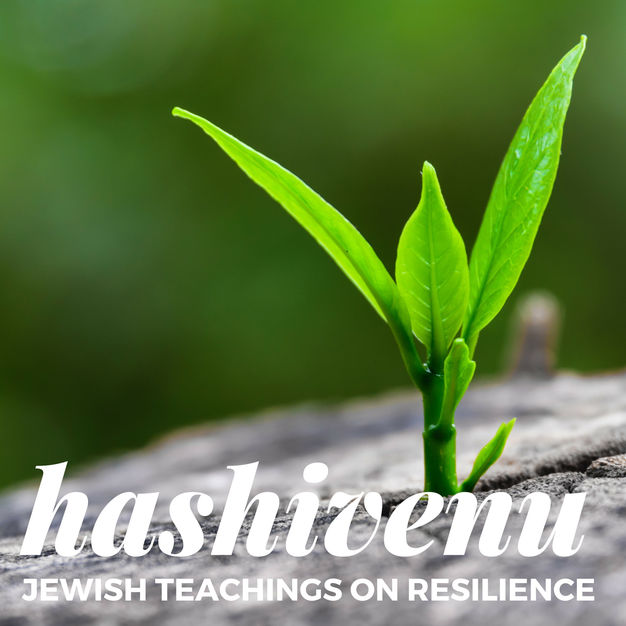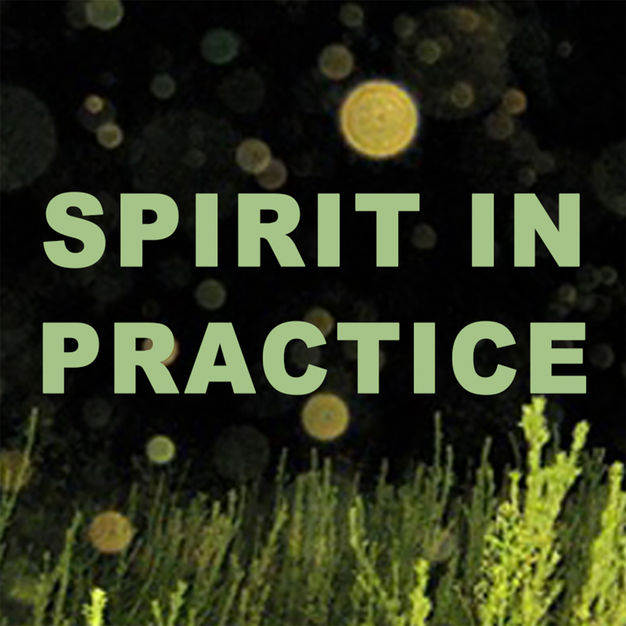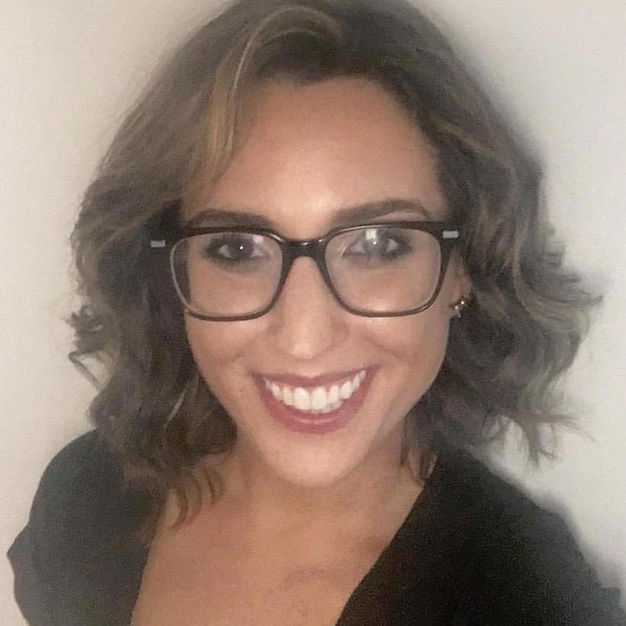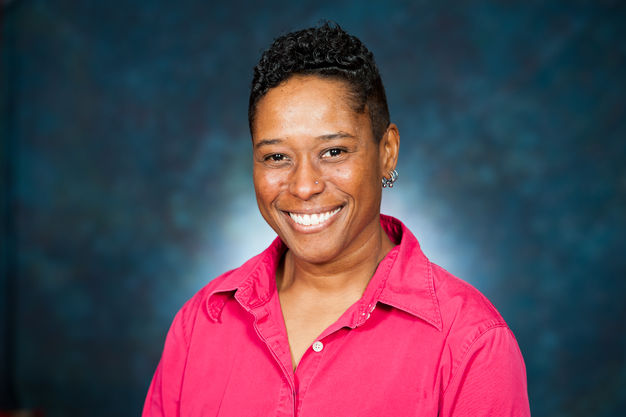
Hashivenu
Reconstructing Judaism
Hashivenu is a podcast about Jewish teachings and practice around resilience. Cultivating resilience in challenging times, both individually and collectively, is an essential path to personal renewal.
- 53 minutes 8 secondsReconstructionist Values, Covenantal Community and War in the Middle East
In preparation for Reconstructing Judaism’s December 15 movement-wide virtual convening, Rabbi Elliott Tepperman and Rabbi Rachel Weiss join Rabbi Deborah Waxman for a deeply thoughtful and nuanced conversation about the difficult and rewarding work of maintaining unity within Jewish communities that sometimes have diverse views on Israel and Palestine and the War in Gaza. Their reflections on how to cultivate spaces of growth, respect and accountability within the synagogue offer a blueprint for creating Jewish communities that are there for us during moments of joy and celebration as well as times of mourning and crisis.
Subscribe by Email
This podcast is produced by Reconstructing Judaism. Visit us at ReconstructingJudaism.org.
Special Guests: Rabbi Elliott Tepperman and Rabbi Rachel Weiss.
Links:
- Learn more about and register for Reconstructing Judaism's 12/15 event
- Reconstructing Judaism’s Convention, B’Yachad, is coming to Philadelphia in 2026
- Read JRC's Covenant of Speech
- Clip from 2022 Convention: Rabbi Elliott Tepperman on creating a community of belonging that includes people even when they step out of line
- Watch the full "Creating Inclusive Community" panel from Reconstructing Judaism's 2022 Convention
- How Rabbi Rachel Weiss and the JRC approach talking about Israel and Palestine in their community
- Rabbi Elliott Tepperman: Bringing a Community-Organizing Model to the Pulpit
- Explore Evolve's essays about Israel and Palestine
- From Evolve: A Septet of Diverse Reflections on the Year Since October 7
- New from Ritualwell, "A Jerusalem Afternoon in Wartime" by Haviva Ner-David
- Explore these poems, prayers and resources from Ritualwell that address communal tragedy. — "When one of us hurts, others are there to offer comfort..."
4 December 2024, 11:00 am - 44 minutes 33 secondsBuilding Covenantal Community in the New Year and Beyond
With the High Holiday season underway, Deborah welcomes Justin Rosen Smolen, Reconstructing Judaism's Vice President for Thriving Communities and Partnerships, for a wide-ranging conversation about covenantal community. They explore how the idea of covenant, from biblical narratives to contemporary community-building, emphasizes relationships, mutual responsibility and interdependence. They consider how liberal religion can help address societal issues like loneliness and division, and advocate for conversations that build inclusive, thriving communities. Later, Deborah and Justin explore a Reconstructionist understanding of covenant, emphasizing the importance of shared values and intergenerational dialogue, and recognizing that while diverse perspectives may create tension, they also provide opportunities for growth and deeper understanding within the community.
This podcast is produced by Reconstructing Judaism. Visit us at ReconstructingJudaism.org.
Special Guest: Justin Rosen Smolen.
Links:
- Watch Deborah's High Holiday teaching on covenantal community
- High Holiday resources from Reconstructing Judaism
- Explore High Holiday prayers and poems on Ritualwell
- Read Deborah in the Times of Israel: As Reconstructionists, Our Litmus Test is Centering Relationships Over Politics
- Read Deborah's latest Evolve piece, "A Jewish Embrace of Democracy: Early Reconstructionist Judaism and America’s Promise"
- Support Reconstructing Judaism with a donation of $36
10 October 2024, 10:00 am - 38 minutes 45 secondsRabbi Elyse Wechterman, CEO of the Reconstructionist Rabbinical Association
Rabbi Elyse Wechterman recently announced that she will step down from her position as CEO of the Reconstructionist Rabbinical Association (RRA) in June after leading the organization for the past nine years. Elyse stops by Deborah’s office to look back on her tenure and look ahead to what’s next. The two longtime colleagues commiserate over the day-to-day realities of leading an organization, including a friendly debate over the pros and cons of “zeroing out” one’s email inbox (4:54). Elyse explains how being willing to let some things go in order to focus on what’s important has helped her decision making as a leader (9:21). Elyse reflects on how the RRA has changed over the last nine years and on the accomplishments she’s most proud of, such as increased collaboration amongst rabbinical associations (15:30). Deborah and Elyse discuss the nature of change and how although it can be scary, it is often a positive (26:22). Finally, Elyse shares her favorite verse from the Talmud and why it’s resonating with her as she approaches this transition (34:00).
This podcast is produced by Reconstructing Judaism. Visit us at ReconstructingJudaism.org.
Special Guest: Rabbi Elyse Wechterman.
Links:
- Stay up on the latest from Reconstructing Judaism by signing up for our weekly Virtual Shabbat Box email
- Watch the panel disccussion, "Democracy and Judaism: Does one need the other to thrive?"
- Listen to Elyse's recent appearance on the Evolve podcast
- Learn more about the RRA
- From the NY Times, "Happy 20th Anniversary, Gmail. I’m Sorry I’m Leaving You"
- PIVOT! PIVOT!
16 May 2024, 10:00 am - 38 minutes 55 secondsCheryl Cook, CEO of Avodah
Rabbi Deborah Waxman welcomes Cheryl Cook, CEO of Avodah, for a wide-ranging conversation. The two longtime friends and hevrutah partners recall their early conversations about Israel and Palestine (3:00). They discuss the nature of leadership in general as well as their own perspectives as women in leadership (10:10). They touch on the importance of resilience in how they have been able to navigate the turbulence of the last 10 years (12:10). Cheryl lays out the mission and work of Avodah (16:30). Later, Cheryl asks Deborah to reflect on the role of gender in leadership and Deborah shares how her feminist ideals shape her approach (18:15). Cheryl talks about stepping into the role of CEO in 2015 as a mother of young children and how she is making the effort to model a different kind leadership for other women (23:00). They close by looking ahead to future generations of leaders that they hope will include not only women, but Jews of Color and people from underrepresented groups as well (33:03). At the start of the show, Deborah catches us up on all things Hashivenu and previews her upcoming 10th anniversary celebratory event “When Women Lead" (happening Wednesday, April 3rd at 7pm EDT). You can find ticket information here.
This podcast is produced by Reconstructing Judaism. Visit us at ReconstructingJudaism.org.
Special Guest: Cheryl Cook.
Links:
- Get tickets to Deborah's 10th anniversary virtual event, "When Women Lead"
- Stay up on the latest from Reconstructing Judaism by signing up for our weekly Virtual Shabbat Box email
- Avodah: Sparking Jewish Leaders, Igniting Social Change
- Learn more about Avodah's Jewish Service Corps
- From The Forge: "Building Resilient Organizations" by Maurice Mitchell
28 March 2024, 10:00 am - 59 minutes 34 secondsHow to become our fullest, most expressive selves? Practice, practice, practice
Weeks ago, Rabbi Deborah Waxman and founder Yoshi Silverstein scheduled this discussion about embodied Jewish practice and antiracism. Did it make any sense to have this conversation in the wake of Hamas’ Oct. 7 massacre of Israeli civilians and hostage taking, the subsequent and unfolding war and its tremendous toll on Palestinian civilians? After pausing to consider, they decided that such a conversation is more important than ever, both to themselves and listeners. Silverstein, founder and director of the Mitsui Collective, explains that in difficult times like these, embodiment practices can help us understand and name the extent to which strong emotions are having an impact on us. Awareness and practice are key to being able to respond to stressful stimuli in a healthy way. He outlines several simple practices that can help, including orienting and box breathing, and quotes Viktor Frankl, the psychotherapist and Holocaust survivor whose writing deeply informs how humans understand trauma. "Between stimulus and response there is a space. In that space is our power to choose our response. In our response lies our growth and our freedom."
This podcast is produced by Reconstructing Judaism. Visit us at ReconstructingJudaism.org.
Special Guest: Yoshi Silverstein.
Links:
24 October 2023, 10:00 am - 38 minutes 40 secondsYom Kippur: A Celebration of Collective Release
In ancient times on Yom Kippur, the high priest of Israel presided over an elaborate, mystical service atop the Temple Mount. Today, many traditional synagogues recount this ritual with the avodah service. In this episode, Rabbi Deborah Waxman, Ph.D., speaks with Rabbi Vivie Mayer about what the avodah service — which they acknowledge is mainly attended by the “die-hards” — can teach us today. “What Yom Kippur is really enacting and celebrating is collective release,” Mayer says. The two discuss what it means to move from the most intense, holy day of the year to the mundane business of daily life and how to bring insights from the former to the later. They delve into the differences between individual and collective atonement and responsibility; wondering about the collective release and catharsis offered by practices of the Second Temple era. They also lift up a contemporary Israeli song, “Seder Ha'Avodah” by Ishay Ribo.
This podcast is produced by Reconstructing Judaism. Visit us at ReconstructingJudaism.org.
Special Guest: Rabbi Vivie Mayer.
Links:
- Listen to "Seder Ha'Avodah" by Ishay Ribo and follow along with the English translation
- Rabbi Deborah Waxman's High Holiday Video Teaching exploring the avodah service
- Explore Reconstructing Judaism's High Holiday Resources
- High Holiday Resources on Ritualwell
- From Evolve: "Breaking Open: A Paradigm for Jewish Prayer" by Rabbi Nathan Kamesar
12 September 2023, 10:00 am - 38 minutes 10 secondsS4 Ep. 9: Season of Reflection and Repentance
In this special episode, Rabbi Deborah Waxman, Ph.D and Rabbi Sandra Lawson discuss their respective processes of preparing for the High Holidays. This isn’t about leading services, but about how, as human beings, they undertake an accounting of the soul, leading to repentance for their own actions and forgiveness toward others. The two friends and colleagues delve into Maimonides as interpreted by Rabbi Danya Ruttenberg in her new book On Repentance and Repair. (Among his many contributions, Maimonides, a medieval Torah scholar, philosopher and physician, outlined five steps needed to make true repentance.) Rabbi Sandra describes her difficult relationship with her late mother, and the forgiveness needed to truly care for her mother during illness. The two widen the lens and examine repentance from a societal point of view: how can society account and repent for harms caused to so many groups: Blacks, indigenous Americans, Asian Americans and so on. The two agree that an American reckoning with its troubled legacy is needed. “I think about teshuvah and when it comes to racial justice work, my focus first of all, is primarily within our Jewish spaces,” Lawson says. “I have found that many Jews who benefit from white privilege tend to continue to look outward on racial justice in the larger world, which is fine. But that also needs to be with our own internal work.”
This podcast is produced by Reconstructing Judaism. Visit us at ReconstructingJudaism.org.
Links:
- On Repentance And Repair: Making Amends in an Unapologetic World by Rabbi Danya Ruttenberg
- Maimonides and Repentance
- "Rabbi Sandra Lawson: The Souls in My Life" for Interfaith America
- "Modeh Ani as a Means for Cultivating Resilience" by Rabbi Deborah Waxman, Ph.D.
- "Opposites Attract" by Paula Abdul
- The newly redesigned ReconstructingJudaism.org
- The newly redesigned Ritualwell.org
- Evolve: Groundbreaking Jewish Conversations
19 September 2022, 10:00 am - 39 minutes 52 secondsS4 Ep. 8: Songs of Joy and Mourning
Reconstructing Judaism board member and Tikkun Olam Commission co-chair Shahanna McKinney-Baldon opens up with Rabbi Deborah Waxman, Ph.D. and Rabbi Sandra Lawson about her time singing for the ska and reggae band Highball Holiday. The educator, activist and artist, who comes an African American and Ashkenazi family, talks about rediscovering her singing voice in middle age, and shedding certain inhibitions and self-consciousness. (Co-host Rabbi Sandra Lawson also recounts embracing public singing in her 40s, partly to connect with Jewish liturgy.) McKinney-Baldon frankly discusses the grieving process following the 2021 loss of her father, as well as her wrestling with the Jewish prohibition on listening to music — let alone performing — during the traditional morning period. The trio discusses a Reconstructionist, values-based approach to engaging with, but not necessarily being dictated by, Jewish tradition. She also discusses her work on the Tikkun Olam Commission and describes the ongoing process of gaining support for a movement-wide resolution supporting reparations for slavery.
This podcast is produced by Reconstructing Judaism. Visit us at ReconstructingJudaism.org.
Special Guest: Shahanna McKinney-Baldon.
Links:
- Edot Midwest Regional Jewish Diversity Collaborative — Edot Midwest Regional Jewish Diversity Collaborative (“Edot”) is a network of partnerships and activities focused on affirming Jewish racial and ethnic diversity across communities in the Midwest region. Investing in the leadership of Jewish People of Color (JOC’s) is our driver for change.
- "I helped coin the term ‘Jews of color.’ It’s time for a history lesson" by Shahanna McKinney-Baldon
- Listen to Highball Holiday on Bandcamp
- Follow Highball Holiday on Instagram
- Milwaukee ska legends Highball Holiday preached racial unity
5 May 2022, 10:00 am - 46 minutes 6 secondsS4 Ep. 7: The Smooth River
On Sept. 3, 2019, Richard Cohen’s wife, Marcia Horowitz, was diagnosed with stage four pancreatic cancer. Horowitz lived 160 more days. In his acclaimed 2021 book, The Smooth River: Finding Inspiration and Exquisite Beauty during Terminal Illness, Cohen, a lawyer and Reconstructionist leader, recounts those days and what the couple learned about life as Horowitz's death approached.
In this special episode, Richard Cohen discusses with Rabbi Deborah Waxman how the couple eschewed the common framing of terminal illness as a battle with the disease – something that is either one or lost. “We wanted to regain some sense of normalcy of who we were, and by doing good for other people, we felt good about ourselves. We were getting our heads above the cancer. It was not going to subsume us.”
Rabbi Waxman and Cohen also discuss how the couple’s approach mirrors resilience practices contained in many Jewish teachings. Quoting from the book of Psalms, Waxman says, “Out of a narrow place, I called to God. God responded and got me out into an expansive place. That tension between narrow and expansive, for me it has been such an incredible guiding metaphor."
Rabbi Sandra Lawson will be back as co-host in the next episode.
__
Subscribe by EmailThis podcast is produced by Reconstructing Judaism. Visit us at ReconstructingJudaism.org. Episode transcript is forthcoming.
Special Guest: Richard S. Cohen.
Links:
- Read the book: The Smooth River
- Ritualwell - death and mourning — While Judaism places great emphasis on our lives in this world, death is an inevitable end for all of us. Often Jews who have been distant from traditional Jewish practice for their whole lives seek the comfort of traditional Judaism in the face of death. For mourners, whose lives are often turned upside down by death, the traditional practices of mourning can provide structure and comfort. Here you will find resources that address each aspect of the process of navigating death and mourning—from the moment of death, to the burial of the body, the tearing of clothes, the weeklong practice of shiva, and the recitation of kaddish.
- A Mussar Practice for Grief
- Kaddish: A Podcast about Death and Dying
- Reconstructing Judaism
- Evolve: Groundbreaking Jewish Conversations
8 April 2022, 10:00 am - 40 minutes 25 secondsS4 Ep. 6: Being an Ally with Empathy, Humility and Courage
There’s an increasing focus in popular discourse on allyship, particularly when it comes to people of color and other marginalized groups. What does it mean to be an ally, both to individuals and to groups? How can one begin to do that work in a way that is meaningful and is about helping others and not about assisting one’s ego or placing oneself at the center of the story? In this episode, Rabbi Deborah Waxman, Ph.D. and Rabbi Sandra Lawson – longtime friends and now colleagues – discuss these questions using examples from their own lives. Noting the importance of relationships and context, they delve into the difficulty of saying and doing the right thing at the right time, citing examples of which they were proud and where they might have done better. In the discussion, Rabbi Sandra stresses that white people who aim to be allies to people of color should, “be humble and be curious, and be open to learning, instead of thinking that [you] can't learn anything.”
Read these show notes on the web at https://hashivenu.fireside.fm/47
This podcast is produced by Reconstructing Judaism. Visit us at ReconstructingJudaism.org.
Links:
- NY Times: "To White People Who Want to Be ‘One of the Good Ones’" by Maeve Higgins
- Chaver Up!: 49 Rabbis Explore What it Means to be an Ally through a Jewish Lens
- Evolve essay: "Racism in the Jewish Community" by Rabbi Sandra Lawson
- Evolve essay: "A Beat to Which We Can All Move" by Rabbi Deborah Waxman, Ph.D.
- Evolve essay: "Noticing Jews of Color in Our Communities" by Carmen Amalia Corrales
- Evolve resource: Jewish Approaches to Justice Work
- The 1619 Project: A New Origin Story
- Ritualwell: "Pride Shabbat Blessing from an Ally" by Sara Stock Mayo
- Ritualwell: "Quick Tips for Transgender Allies" by TransfaithOnline.org
- Ritualwell: "Modah Ani" poem by Martha Hurwitz
28 December 2021, 11:00 am - 39 minutes 53 secondsS4 Ep. 5: JewAsian
Helen K. Kim is Professor of Sociology at Whitman College and in 2019 assumed the position of Associate Dean for Faculty Development. She is also the co-author of JewAsian: Race, Religion, and Identity for America's Newest Jews along with her husband Noah Leavitt. In this interview, Kim discusses macro topics such as racism in the Jewish community and the rancorous debate over communal demography. She also discusses more personal matters, including her experience of her son’s recent bar mitzvah. The episode begins with Kim talking about her search for wisdom in the Jewish tradition and how she found inspiration in the works of Maimonides, the medieval Jewish philosopher and Torah commentator. Later, she expresses her frustration with Jewish organizations that long acknowledged the prevalence of racism behind closed doors but steered clear of addressing racism publicly. “Why are we choosing to run away from [these realities]? Why don't we choose to run towards them and try to do something about them to become anti-racist.”
This podcast is produced by Reconstructing Judaism. Visit us at ReconstructingJudaism.org.
Special Guest: Helen K. Kim.
Links:
- JewAsian: Race, Religion, and Identity for America's Newest Jews — JewAsian is a qualitative examination of the intersection of race, religion, and ethnicity in the increasing number of households that are Jewish American and Asian American.
- "Funny - You Don't Look Jewish" by Helen K. Kim — Episode guest Helen K. Kim writes that, "Raising [my children] Ari and Talia with a strong and nuanced sense of identity is not so simple as having kimchi in our refrigerator and challah on Friday nights."
- What It's Like For Non-White Jews During The High Holidays — Helen K. Kim and Rabbi Sandra Lawson were both featured in this 2015 HuffPost Religion piece asking a few racially and ethnically diverse American Jewish families to offer a reflection on their relationship to Judaism.
- A Jewish-Asian Couple's Union Leads to a Scholarly Interest in Intermarriage — NY Times profile on Helen Kim and Noah S. Leavitt
- The Laws of Teshuvah in the Mishneh Torah — The Laws of Teshuvah By Rabbi Moshe ben Maimon ("Maimonides"); translated by Eliyahu Touger
- Rabbi David Basior on Teshuvah as Resilience — Rabbi David Basior speaks about how the Jewish value of teshuvah holds power in interpersonal relationships.
- The Challenges and Unexpected Rewards of ‘Teshuvah’
26 October 2021, 10:00 am - More Episodes? Get the App
Your feedback is valuable to us. Should you encounter any bugs, glitches, lack of functionality or other problems, please email us on [email protected] or join Moon.FM Telegram Group where you can talk directly to the dev team who are happy to answer any queries.
 Spirit In Practice
Spirit In Practice
 Bad Jew Weekly
Bad Jew Weekly
 Hineni (Here I Am)
Hineni (Here I Am)
 Evolve
Evolve
 Kehillat Israel Podcasts
Kehillat Israel Podcasts
 Talking in Shul - Jewish Public Media
Talking in Shul - Jewish Public Media